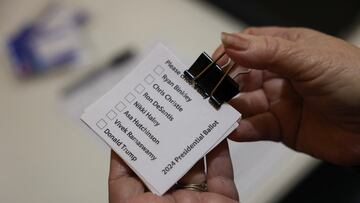Why does Iowa have a caucus instead of a primary?
The caucus system has deep roots in the state’s political culture and dates back several decades, bucking the trend of the majority of states choosing primary voting.


As the nation turns its attention to Iowa, the Hawkeye State is gearing up for a crucial moment in the 2024 presidential race with its traditional caucus system, distinguishing itself from the majority of states that opt for primary elections. The eve of the vote has brought a flurry of activity, with candidates making final appeals to voters despite the bitterly cold conditions.
The results determine the number of delegates that each candidate will receive from that precinct. Delegates are individuals who will go on to represent their candidate at the national conventio; the candidate who secures a majority of delegates becomes the official presidential nominee for the party for the November election.
"It's not really a matter of whether or not Trump wins. But for the other candidates, a second place finish is kind of a win for any of them. At a minimum, it gives them a rationale for keeping their campaign going."@jrpsaki on what she's watching tonight during the Iowa Caucus pic.twitter.com/ItakfA7rPa
— Inside with Jen Psaki (@InsideWithPsaki) January 16, 2024
The Iowa caucus vote is the unofficial beginning of the presidential election. The caucus system is a method used by some states to allocate delegates to candidates seeking the nomination of their respective political parties.
The difference between caucuses and primaries
Caucuses and primaries are the two different methods used by US states to select candidates for political office.
For caucuses in Iowa, participants gather at a specified time and location, openly discuss their preferred candidates, and then vote by secret ballot for their candidate. The results are then submitted to the Iowan Republican Party as causcuses are organised by the state party.
Alternatively, primary votes are held at polling places, similar to the general election. The voting process is private, and individuals mark their choices on a ballot. There is no discussion held.
Iowa and the presidential election
Related stories
Iowa’s first-in-the-nation status in the presidential nominating process dates back to the 1970s when the Democratic Party adopted the caucus system. The state wanted to have a significant impact on the selection of presidential candidates, and the caucus system provided a platform for this.
"I think we’re going to have a tremendous night tonight," Trump said ahead of the Iowa caucuses https://t.co/Cl41Of38Ea pic.twitter.com/qbuOuXOK69
— Bloomberg (@business) January 15, 2024
This status gives it outsized influence in shaping the narrative of the presidential race.

